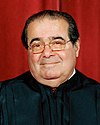
Back Portail:Conservatisme French Portal:Konservatisme NB Portal:Conservadorismo Portuguese Portal:Konservatism Swedish
| Main page | Showcase | Project |
Introduction
Conservatism is a cultural, social, and political philosophy and ideology, which seeks to promote and preserve traditional institutions, customs, and values. The central tenets of conservatism may vary in relation to the culture and civilization in which it appears. In Western culture, depending on the particular nation, conservatives seek to promote and preserve a range of institutions, such as the nuclear family, organised religion, the military, the nation-state, property rights, rule of law, aristocracy, and monarchy. Conservatives tend to favour institutions and practices that enhance social order and historical continuity.
Edmund Burke, an 18th-century Anglo-Irish statesman who opposed the French Revolution but supported the American Revolution, is credited as one of the forefathers of conservative thought in the 1790s along with Savoyard statesman Joseph de Maistre. The first established use of the term in a political context originated in 1818 with François-René de Chateaubriand during the period of Bourbon Restoration that sought to roll back the policies of the French Revolution and establish social order.
Conservatism has varied considerably as it has adapted itself to existing traditions and national cultures. Thus, conservatives from different parts of the world, each upholding their respective traditions, may disagree on a wide range of issues. Historically associated with right-wing politics, the term has been used to describe a wide range of views. Conservatism may be either libertarian or authoritarian, populist or elitist, progressive or reactionary, moderate or extreme. (Full article...)
Selected article
In his quarter-century on the Supreme Court, Scalia had staked out a conservative ideology in his opinions, advocating textualism in statutory interpretation and originalism in constitutional interpretation. He was a strong defender of the powers of the executive branch, believing presidential power should be paramount in many areas. He opposed affirmative action and other policies that treat minorities as groups. He filed separate opinions in large numbers of cases, and, in his minority opinions, often castigated the Court's majority in scathing language.
Selected quote
Reversing Britain’s economic decline was such a huge and painful undertaking that, at least until the later years, the economy had to come first.
In fact, though flawed in some respects, the speech with its emphasis on remoralising society and on strengthening the family, deserves re-reading.
It does not though, reveal much about his essential philosophy, which with Keith — as with most professional politicians — remained below the surface.
The kind of Conservatism which he and I — though coming from very different backgrounds — favoured would be best described as "liberal", in the old-fashioned sense. And I mean the liberalism of Mr Gladstone not of the latter day collectivists.
That is to say, we placed far greater confidence in individuals, families, businesses and neighbourhoods than in the State.
— Margaret Thatcher, Keith Joseph Memorial Lecture ("Liberty and Limited Government"), 11 January 1996
Selected image
The United States presidential election of 1964 was held on November 3, 1964. Incumbent President Lyndon B. Johnson had come to office less than a year earlier following the assassination of his predecessor, John F. Kennedy. Johnson, who had successfully associated himself with Kennedy's popularity, won 61.1% of the popular vote, the highest won by a candidate since 1820. It was the sixth-most lopsided presidential election in the history of the United States. The Republican candidate, Senator Barry Goldwater of Arizona, suffered from a lack of support from his own party and his far-right political positions. Johnson's campaign successfully portrayed Goldwater as being a dangerous extremist, and advocated social programs which became known as the Great Society. Johnson easily won the Presidency, carrying 44 of the 50 states and the District of Columbia. However, Goldwater's unsuccessful bid influenced the Republican Party and the modern conservative movement.
Credit: SteveSims
Did you know...
- ...that Ronald Reagan is the only president of the United States to have his diaries published into a best selling book?
- ...that the Duncan L. Hunter 2008 presidential campaign was endorsed by both Chuck Yeager and Ann Coulter?
- ... that Jens Wisløff, a Norway Conservative Party politician, was called "the grand old man of asphalt"?
Selected anniversaries in May
- 1979 – Margaret Thatcher becomes the first female Prime Minister of the United Kingdom.
- 1940 – the Norway Debate in the British House of Commons begins, and leads to the replacement of Prime Minister Neville Chamberlain with Winston Churchill three days later.
- 1988 – Section 28 is enacted in Great Britain with the effect of prohibiting the promotion of homosexuality by local authorities.
Topics
Associated Wikimedia
The following Wikimedia Foundation sister projects provide more on this subject:
-
Commons
Free media repository -
Wikibooks
Free textbooks and manuals -
Wikidata
Free knowledge base -
Wikinews
Free-content news -
Wikiquote
Collection of quotations -
Wikisource
Free-content library -
Wikiversity
Free learning tools -
Wiktionary
Dictionary and thesaurus
© MMXXIII Rich X Search. We shall prevail. All rights reserved. Rich X Search









